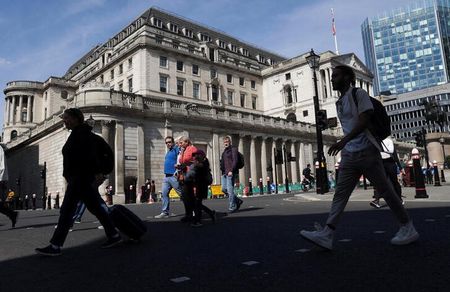LONDON (Reuters) -Britain will elect a new government on July 4, with voters focussed on the high cost of living, failing public services and rising immigration among other issues.
Below is a closer look at the key areas of concern.
COST OF LIVING AND ECONOMY
Ipsos polls in recent months have shown that a majority of Britons feel economically worse off than they did at the time of the last election in 2019.
Living standards have fallen after two years of high inflation fuelled partly by the war in Ukraine that sent energy prices soaring.
Wages are now rising faster than prices, but the economy is not growing fast enough because of weak investment, slow productivity growth and a shortage of workers.
The government can not boost spending, partly because of weak growth and high levels of public debt. Higher interest rates mean it is paying a heavy price to service the debt it took on to shield the economy through COVID-19 and the 2022 energy price spike.
STRUGGLING HEALTH SERVICE
For many voters, the struggling state of the National Health Service – a treasured public institution which has offered free healthcare at the point of use for 75 years – symbolises everything wrong with their country today.
The NHS, which built up a huge backlog of treatments during the COVID-19 pandemic, has since been facing severe staff shortages, strikes by doctors and nurses and the increasingly expensive medical demands of an ageing population.
As a result, the average Briton often has to wait several weeks to see a doctor for non-urgent care. And a list of patients waiting to begin hospital treatment has ballooned to more than 7 million cases.
NHS dental care faces its own crisis. An estimated 12 million Britons who need dental care are unable to access it.
IMMIGRATION
Immigration has played a central role in British politics for more than a decade. Polling in February by Ipsos showed that 37% of voters named it as an issue that would be very important in deciding how they vote – the fourth-most chosen response behind healthcare, the cost of living and the overall economic situation.
Concern over the number of people coming to Britain helped drive the 2016 vote for Brexit and is behind the government’s current efforts to deter asylum seekers arriving in small boats by trying to send them to Rwanda when they arrive.
HOUSING
Many younger voters cannot afford to buy a house in Britain and far fewer of them own one than they did two decades ago.
While average earnings have doubled between 1997 and 2023, house prices have increased four-and-a-half times, according to Britain’s Office for National Statistics.
Rents have also become costlier, and high interest rates due to high inflation have pushed up mortgage rates.
Britain has also been unable to build the estimated 300,000 extra homes it needs each year to tackle a housing under-supply and help curb price rises.
SENSE OF DECLINE
Beyond the specific issues, many voters feel that things in Britain are simply not working as well as they once used to, contributing to a broader sense of decline.
A YouGov poll earlier this month showed that three-quarters of Britons think the UK is in a worse state than it was in 2010, when the governing Conservative Party came to power.
The NHS is overstretched, the prisons are overcrowded, many school buildings are crumbling, the railways are beset by delays and creaking infrastructure, and even the once-formidable British army has been judged ill-prepared to face war.
CLIMATE
Polls show that the public still supports Britain’s legally binding 2050 net zero target, but there is evidence that they baulk at policies that they think distribute the costs of achieving that unfairly.
Others, particularly younger and more progressive voters, think Britain is not pursuing radical enough policies to achieve its climate goals.
($1 = 0.7875 pounds)
(Reporting by William James and Sachin Ravikumar; Editing by Andrew Heavens)










